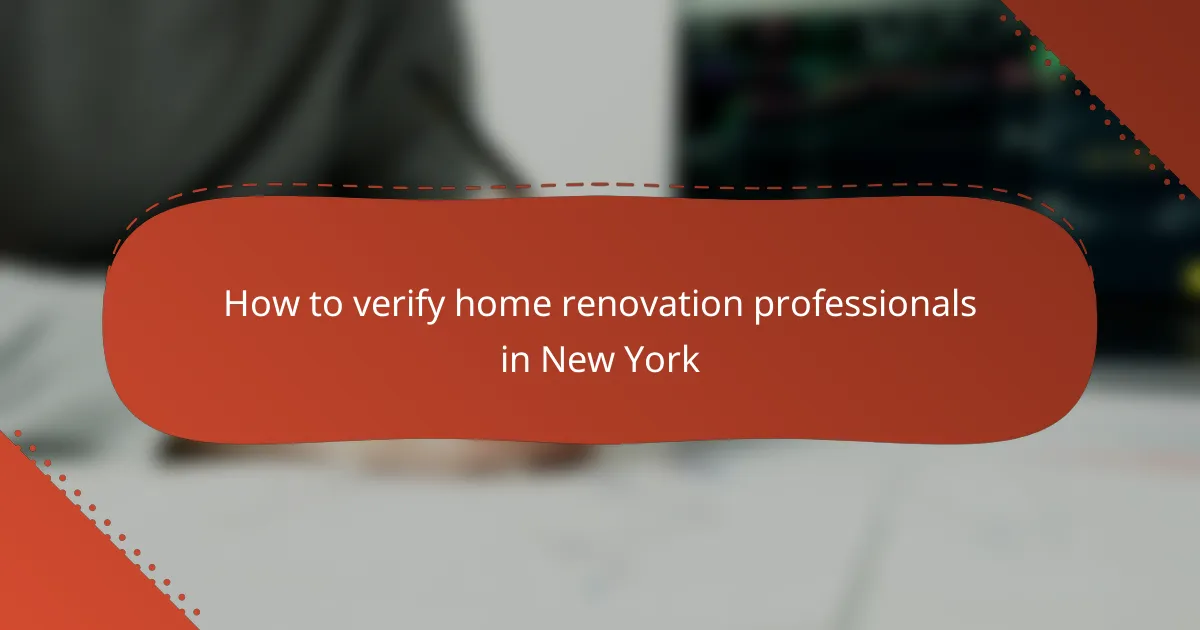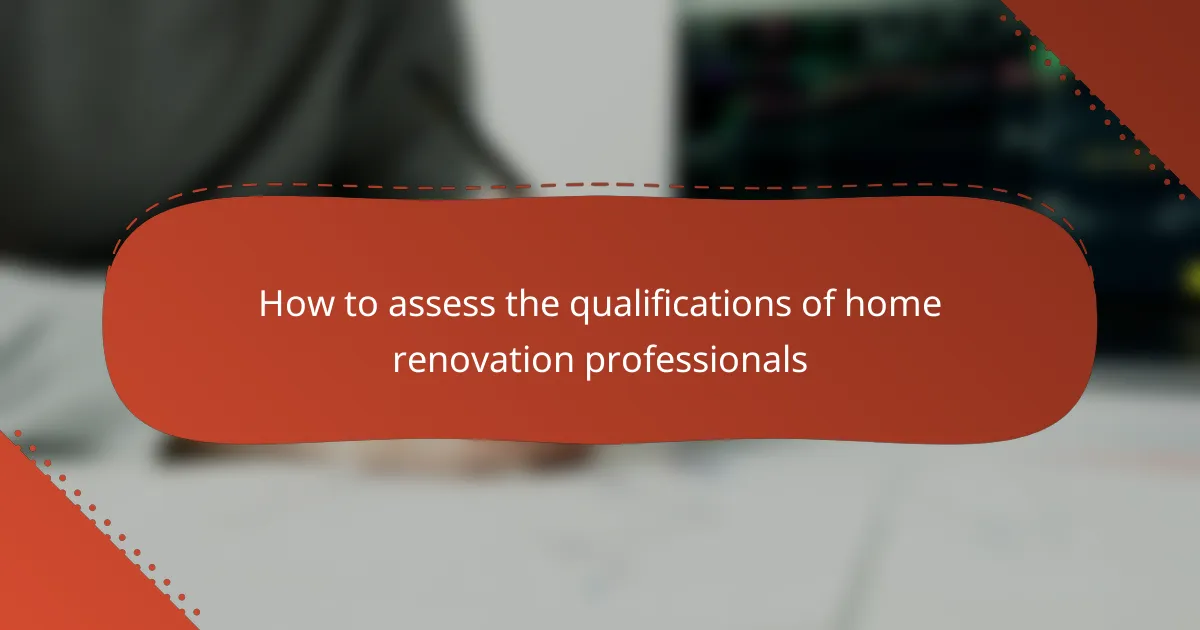When embarking on a home renovation project, verifying the credentials and reliability of professionals is crucial. Conducting thorough reference checks and assessing their online presence can help ensure you hire qualified individuals who will meet your renovation needs effectively. By asking targeted questions during reference checks, you can gain valuable insights into a contractor’s work quality and communication skills, helping you make an informed decision.

How to verify home renovation professionals in New York
To verify home renovation professionals in New York, start by assessing their online presence, client feedback, and credentials. This process ensures you hire qualified individuals who can meet your renovation needs effectively.
Check online reviews
Online reviews provide insights into the experiences of previous clients with home renovation professionals. Look for reviews on platforms like Google, Yelp, and Angie’s List to gauge overall satisfaction and identify any recurring issues.
Pay attention to the number of reviews and the average rating. A professional with a high volume of positive reviews is generally a safer choice than one with few or mixed reviews.
Request references from past clients
Asking for references from past clients allows you to speak directly with individuals who have worked with the contractor. This can provide valuable information about the quality of work, reliability, and communication skills.
When contacting references, inquire about their overall satisfaction, whether the project stayed on budget, and if the work was completed on time. This firsthand feedback can help you make an informed decision.
Use local contractor directories
Local contractor directories, such as the New York City Department of Consumer Affairs or HomeAdvisor, can help you find licensed professionals in your area. These directories often include ratings, reviews, and contact information.
Utilizing these resources can streamline your search and ensure you are considering contractors who are recognized and vetted within the community.
Verify licenses and insurance
In New York, home renovation professionals are required to hold specific licenses and insurance. Verify that the contractor has a valid license by checking with the New York State Department of State.
Additionally, ensure they carry liability insurance and workers’ compensation. This protects you from potential liabilities in case of accidents or damages during the renovation process.
Consult with the Better Business Bureau
The Better Business Bureau (BBB) can provide information on a contractor’s business practices and any complaints filed against them. Check their BBB rating and read through any customer complaints to understand potential red flags.
A contractor with a good BBB rating and minimal complaints is likely to be more trustworthy and reliable for your home renovation project.

What questions to ask during reference checks
During reference checks, it’s essential to ask targeted questions that reveal the contractor’s reliability, quality of work, and communication skills. These inquiries help you gauge whether the contractor is a good fit for your home renovation project.
How was the overall experience?
Inquire about the client’s overall satisfaction with the contractor’s work. Ask them to rate their experience on a scale from one to ten and to explain their rating. This will provide insight into the contractor’s ability to meet expectations and deliver quality results.
Consider asking specific questions about the final outcome compared to the initial vision. This can reveal how well the contractor understood and executed the project requirements.
Were there any issues during the project?
It’s crucial to understand if any problems arose during the renovation. Ask the reference if they encountered any significant challenges and how these were resolved. This will help you assess the contractor’s problem-solving abilities and resilience under pressure.
Additionally, inquire about the contractor’s approach to unforeseen issues. A good contractor should be proactive in addressing problems and keeping the client informed throughout the process.
How did the contractor handle communication?
Effective communication is vital in any renovation project. Ask the reference how often the contractor provided updates and whether they were responsive to questions or concerns. This can indicate how well the contractor manages client relationships.
Consider asking about the preferred communication methods used (e.g., phone, email, in-person meetings) and whether the contractor was flexible in accommodating the client’s preferences. Clear communication can significantly impact the overall renovation experience.

What are the red flags to watch for?
When hiring home renovation professionals, several red flags can indicate potential issues. Being aware of these warning signs can help you avoid costly mistakes and ensure you choose a reliable contractor.
Lack of proper licensing
One of the most significant red flags is the absence of proper licensing. Most regions require contractors to hold specific licenses to operate legally, which ensures they meet local standards and regulations. Always verify that the contractor has the necessary licenses for your area, as working with unlicensed professionals can lead to legal complications.
Check with your local licensing authority to confirm the contractor’s credentials. If they cannot provide proof of licensing, consider this a strong warning sign and look for alternatives.
Poor communication skills
Poor communication skills can severely impact the success of your renovation project. If a contractor is unresponsive, vague, or difficult to reach, it may indicate a lack of professionalism or commitment. Clear communication is essential for discussing project details, timelines, and any potential issues that may arise.
During initial consultations, pay attention to how well the contractor listens and addresses your concerns. If they struggle to communicate effectively, it may be best to seek someone who prioritizes open dialogue.
Unwillingness to provide references
A reputable contractor should readily provide references from past clients. If a contractor hesitates or refuses to share this information, it could indicate a lack of experience or unsatisfactory work history. References allow you to gauge the quality of their work and customer satisfaction.
When checking references, ask specific questions about the contractor’s reliability, quality of work, and ability to meet deadlines. If you receive negative feedback or vague responses, consider it a warning sign and explore other options.

How to assess the qualifications of home renovation professionals
To effectively assess the qualifications of home renovation professionals, focus on their certifications, project portfolios, and industry affiliations. These factors provide insights into their expertise, reliability, and standing within the renovation community.
Check certifications and training
Start by verifying any relevant certifications and training that the home renovation professional holds. Look for credentials from recognized organizations, such as the National Association of Home Builders (NAHB) or local licensing boards, which indicate a commitment to industry standards.
Additionally, inquire about ongoing education. Professionals who participate in workshops or advanced training are often more up-to-date with the latest techniques and regulations. This can be a sign of dedication to their craft.
Evaluate portfolio of completed projects
A strong portfolio showcases a professional’s previous work and provides a tangible measure of their skills. Review a variety of completed projects to assess the quality and style of their work, ensuring it aligns with your vision for your renovation.
Ask for references from past clients and, if possible, visit completed projects in person. This will give you a better understanding of the professional’s craftsmanship and attention to detail.
Review industry affiliations
Industry affiliations can indicate a home renovation professional’s credibility and commitment to best practices. Membership in professional organizations often requires adherence to ethical standards and ongoing education.
Check if the professional is involved in local trade associations or community groups. Active participation can reflect a strong network and reputation, which can be beneficial for your project in terms of reliability and resource access.

What are the costs associated with hiring renovation professionals in Los Angeles
Hiring renovation professionals in Los Angeles can range from a few thousand to several tens of thousands of dollars, depending on the scope of the project. Factors influencing costs include labor rates, materials, and the complexity of the renovations.
Labor Costs
Labor costs in Los Angeles typically range from $50 to $150 per hour for skilled tradespeople. General contractors may charge a flat fee or a percentage of the total project cost, often between 10% to 20%. It’s essential to get multiple quotes to ensure competitive pricing.
Material Expenses
Material expenses can vary widely based on the quality and type of materials chosen. For example, basic materials for a kitchen remodel might start around $10,000, while high-end finishes can push costs to $30,000 or more. Always factor in a budget for unexpected material costs.
Permits and Fees
In Los Angeles, renovation projects often require permits, which can add several hundred to several thousand dollars to your budget. Permit fees depend on the project type and size, so check with the local building department for specific requirements and costs.
Contingency Budget
It’s wise to set aside a contingency budget of 10% to 20% of your total renovation costs for unexpected expenses. This buffer can help cover unforeseen issues like structural repairs or code compliance adjustments that may arise during the renovation process.
